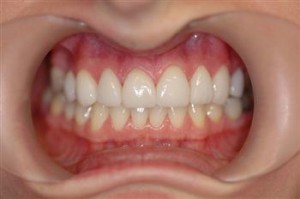
TENS of thousands of Scottish children will no longer benefit from free cosmetic dental work unless it directly affects their health, it emerged today (Wed).
Under the new government rules, any brace that is for cosmetic or aesthetic purposes will no longer be funded by the NHS.
Parents could now face a bill of up to £2,000 to fix their children’s teeth if forced visit a private orthodontist, unless the case is very extreme.
Government officials have told orthodontists that they must prove that a patient’s health will be improved by treatment before referring them for free treatment.
The new rules, which the Tories described as “stealth cuts”, will come into force on Friday, despite surgeries being told about the changes only two weeks ago.
TV Channel
The revelation to cut costs comes just as Health Secretary Nicola Sturgeon announced that ministers had spent £171,000 on a TV channel for the health service.
Dentist Mark Donaldson – who has practises in the north-east of Scotland – believes tens of thousands of people will lose out under the new rules.
“Around 50,000 people a year may no longer meet the required criteria for treatment,” he said.
“What this directive does is effectively draw a line in the sand to say what should and shouldn’t be paid for by the health service.
“A lot of young people are concerned about things like twisted front teeth and, while it will look quite severe to them, unfortunately we will no longer be able to provide treatment on the health service.
“The cost they will face depends. At the very least they will pay £400 for a removable appliance. Fixed appliances and a treatment plan for 18 months will cost £2,000, or perhaps even more.”
He added: “This will cut the waiting lists but the main reason is the government is cutting its cloth to match expenditure.”
Practices have been warned that if they treat people who do not fix the new criteria, called the Index of Orthodontic Treatment Need (IOTN), they will not get paid.
Conservative health spokesman Murdo Fraser MSP said: “A lot of young people get braces for cosmetic reasons because nobody wants to grow up with buckled teeth.
“It is very disappointing news that this directive has gone out to dentists without any publicity or patients being directly informed.
“There are many young people who currently benefit from orthodontic treatment who in the future will only be able to access it if their parents are able to afford it.
“This represents a stealth cut in dental services, and the Scottish Government needs to be more open about their reason for taking this decision and the impact it will have on the nation’s oral health.”
Change
Robert Kinloch, chairman of the Scottish Dental Practice Committee, said the new rules would leave many patients disappointed.
“The new criteria for accessing eligibility for NHS orthodontic treatment represent a change for patients and dentists alike,” he said.
“Undoubtedly some patients who do not satisfy the IOTN specification will be disappointed that they will not be eligible for NHS treatment, so it’s important that the Scottish Government produces guidance to help patients understand what the index means for them.”
But the Scottish Government said that it was not looking to cut the dental budget but prioritise spending to make sure it went to those who needed it most.
A spokeswoman said: “In 2010-2011 there were 138,035 courses of NHS orthodontic treatment, and a patient can have more than one course of treatment.
“Over the years, the demand for orthodontists has increased so we would normally have expected that increase to have continued. With the introduction of IOTN, we would expect to see a reduction in the projected increase.
“The Scottish Government is not attempting to reduce GDS expenditure but to ensure that expenditure is focused on those patients where there is obvious clinical benefit from orthodontic treatment.
Inverness dentist Chris Parkin, who works at the Stoneyfield Dental Surgery, is backing the government’s controversial move.
He estimated that about 60% of those he referred to an orthodontist were seeking treatment for aesthetic reasons.
“My personal view is that, if money has to be saved on coronary care or cancer care or orthodontics, then it’s a no-brainer,” he said.
“Personally, I agree with the changes.
“Parents will have to pay if they want their children to have perfectly aligned teeth, but it’s fair enough.”

